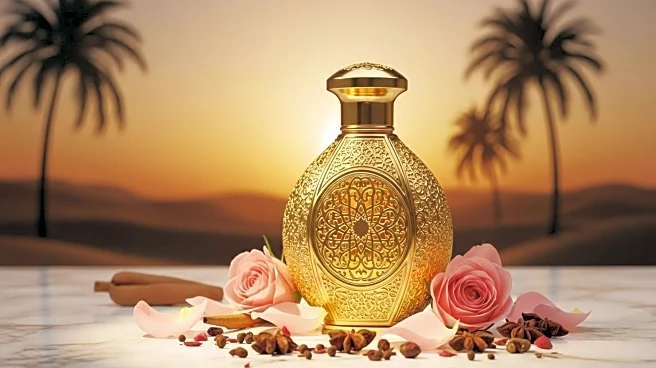What's Happening?
Arab-inspired fragrance brands are experiencing significant growth in the U.S. market, driven by increasing consumer interest in oud and Arabian perfumes. Brands like Kayali, Lattafa, and Amouage are leading this trend, with Kayali becoming the top fragrance brand at Sephora in the first half of 2025. Lattafa has seen substantial sales growth through TikTok Shop, while Amouage plans to open new boutiques in the U.S. and Riyadh. The popularity of these brands is attributed to their unique scent profiles, combining gourmand notes with oud, and their strategic use of social media platforms to reach a wider audience.
Why It's Important?
The expansion of Arab-inspired fragrance brands in the U.S. reflects a broader shift in consumer preferences towards more exotic and complex scent profiles. This trend is reshaping the fragrance industry, offering opportunities for brands to capitalize on the growing demand for unique and culturally rich products. The success of these brands highlights the potential for other international fragrance houses to enter the U.S. market, potentially leading to increased competition and innovation within the industry. Additionally, the use of social media as a marketing tool underscores the importance of digital platforms in driving consumer engagement and sales.
What's Next?
As Arab-inspired fragrance brands continue to gain traction, they are likely to expand their physical presence through pop-up events and new boutique openings. This strategy aims to enhance consumer interaction and brand experience, potentially leading to increased brand loyalty and sales. The ongoing growth of these brands may prompt other fragrance companies to explore similar scent profiles and marketing strategies to capture the interest of U.S. consumers. Furthermore, the success of these brands could influence the fragrance industry to diversify its offerings, incorporating more culturally diverse and innovative products.
Beyond the Headlines
The rise of Arab-inspired fragrances in the U.S. market may have cultural implications, fostering greater appreciation and understanding of Middle Eastern traditions and aesthetics. This trend could contribute to a broader cultural exchange, influencing not only the fragrance industry but also fashion and lifestyle sectors. Additionally, the emphasis on unique scent profiles may encourage consumers to explore and embrace diversity in their personal care choices, potentially leading to a more inclusive and varied market landscape.









